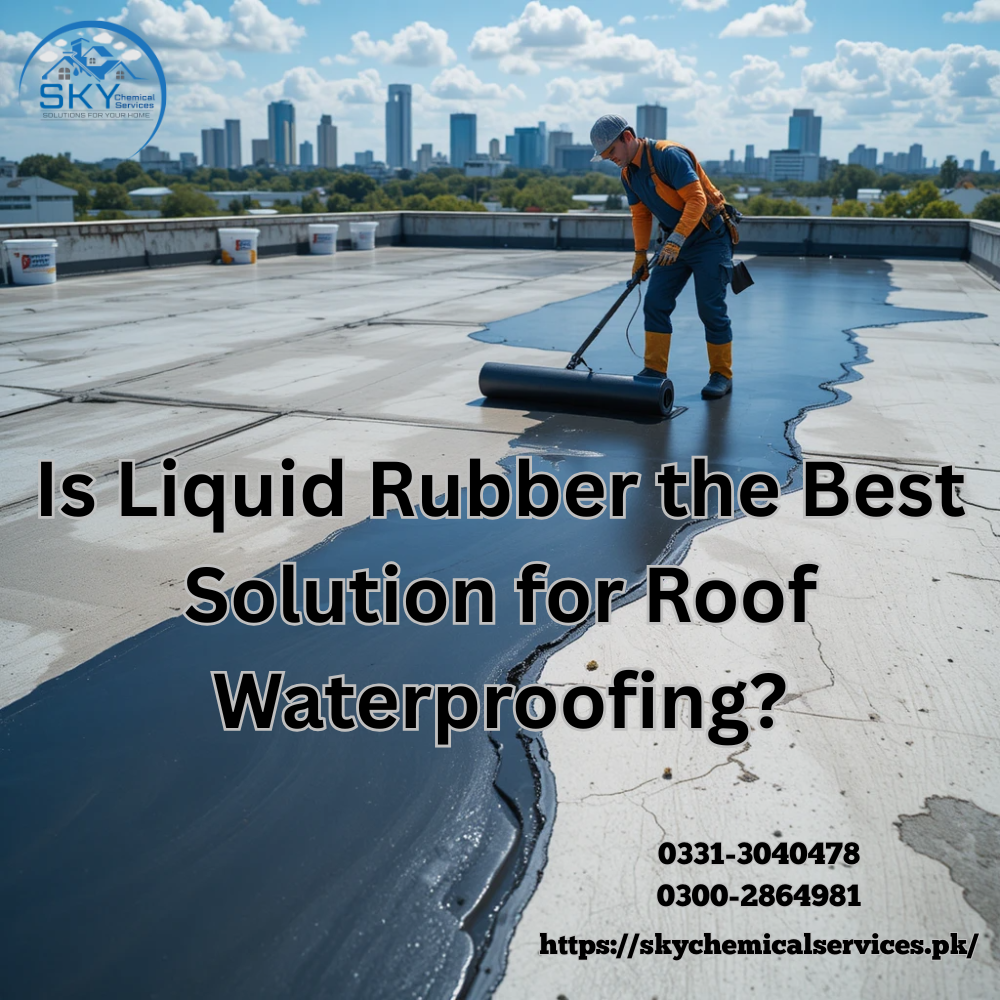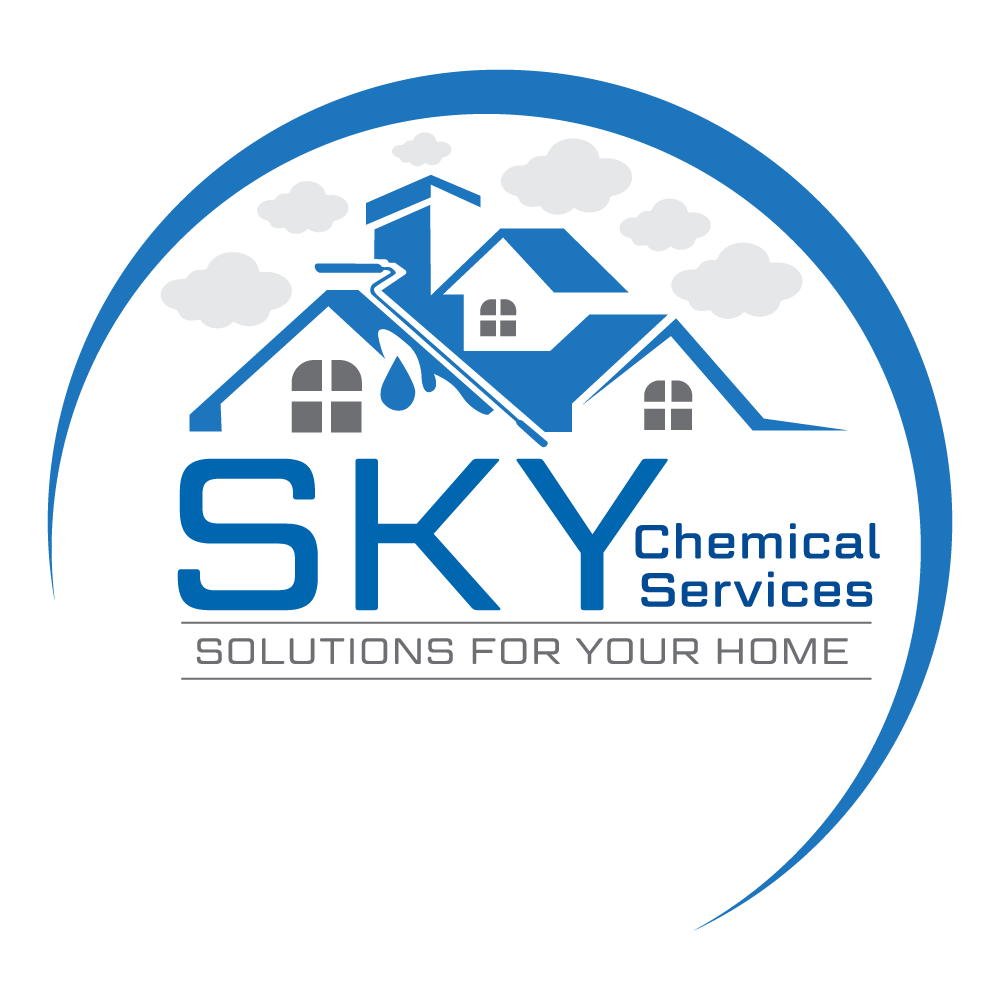In Karachi, where summers are scorching, monsoon rains are intense, and humidity is constant, roofs take a beating throughout the year. Cracks, leaks, and dampness are common complaints for homeowners and businesses alike. That’s why waterproofing has become one of the most important investments in protecting a building.
Among the many waterproofing methods available, liquid rubber roof waterproofing has gained a lot of attention. It’s marketed as a durable, flexible, and long-lasting solution that can handle harsh weather. But is liquid rubber really the best solution for roof waterproofing in Karachi? Let’s break it down.

Why Roof Waterproofing Matters in Karachi
Karachi’s climate creates the perfect recipe for roof damage:
- Intense sun exposure: UV rays dry out and weaken concrete, bitumen, and other roofing materials.
- Heavy rainfall: The monsoon season causes water pooling and seepage, especially on flat concrete roofs.
- Humidity: Constant moisture encourages mold, mildew, and dampness indoors.
- Dust and pollution: Airborne particles settle on rooftops, clogging drains and worsening cracks.
Without waterproofing, these issues quickly turn into serious problems—leaks inside the house, damaged plaster, weakened concrete, and even electrical hazards.
That’s why choosing the right waterproofing solution isn’t optional in Karachi—it’s a necessity.
What Is Liquid Rubber Roof Waterproofing?
Liquid rubber is a waterproofing product that comes in liquid form and cures into a rubber-like membrane once applied. Think of it as painting on a layer of flexible rubber that seals the roof. It can be applied with a brush, roller, or spray, making it easy to cover even uneven surfaces.
Liquid rubber products are typically made from elastomeric polymers. These materials stretch, bend, and flex with the roof as temperatures change, preventing cracks and leaks.
Key Benefits of Liquid Rubber Waterproofing
So, what makes liquid rubber so popular for roof waterproofing in Karachi? Here are the main advantages:
1. Seamless and Flexible
Unlike sheet-based systems that have joints and seams (weak points where leaks often begin), liquid rubber creates a continuous membrane with no gaps. It can stretch with temperature changes, reducing the risk of cracks.
2. UV and Heat Resistant
Karachi’s harsh sun breaks down many waterproofing systems over time. Liquid rubber is UV resistant, which means it won’t crack or peel easily under heat.
3. Strong Water Barrier
Once cured, the membrane is fully waterproof. It resists water pooling and prevents seepage even during heavy monsoon rains.
4. Easy Application
Because it’s applied like paint, liquid rubber is ideal for irregular or complex roof surfaces where sheets or tiles don’t fit well.
5. Long Lifespan
With proper application and maintenance, liquid rubber coatings can last 10–15 years or more, depending on the quality of the product.
6. Eco-Friendly Options
Many liquid rubber products are non-toxic, odorless, and safe for both indoor and outdoor use.
Potential Drawbacks to Consider
No waterproofing method is perfect. Before deciding, here are some things to keep in mind about liquid rubber:
- Surface preparation is critical: If the roof isn’t cleaned and primed properly, the coating may not adhere well.
- Thickness matters: Applying too thin a layer reduces durability.
- Not always the cheapest option: Liquid rubber can be costlier upfront compared to cementitious coatings.
- Recoating required: Over time, the roof may need a reapplication to maintain protection.
This is why professional application is so important—you want the job done right the first time.
How Liquid Rubber Compares to Other Waterproofing Methods
To understand whether liquid rubber is the best choice, let’s compare it with some alternatives used in Karachi:
- Cementitious coatings: Affordable and easy to apply, but prone to cracks over time and not UV resistant.
- Bituminous sheets: Durable and long-lasting, but seams can weaken and require skilled torching during installation.
- Polyurethane foam: Provides both waterproofing and insulation, but it’s expensive and needs careful handling.
- PVC/TPO membranes: Excellent durability, but usually better for industrial or large commercial projects.
Compared to these, liquid rubber offers a balance of durability, flexibility, and ease of use, which makes it attractive for both homes and small businesses in Karachi.
Applications of Liquid Rubber in Karachi
Liquid rubber isn’t just for flat concrete roofs. It can also be used for:
- Rooftop water tanks
- Balconies and terraces
- Basements and foundations
- Corrugated metal roofs
- Industrial sheds
This versatility makes it a solid option for Karachi’s diverse mix of residential and commercial buildings.
Why Professional Waterproofing Matters
Some property owners in Karachi try DIY waterproofing with store-bought products, but the results rarely last. Common mistakes include:
- Skipping surface preparation.
- Applying too thin a coat.
- Using low-quality materials.
- Not sealing roof edges and joints properly.
Professionals ensure that the surface is clean, cracks are repaired, and the coating is applied evenly and at the right thickness. They also know how to handle Karachi’s weather conditions—like timing applications to avoid humidity or rainfall.
Sky Chemical Services: Liquid Rubber Experts in Karachi
When it comes to roof waterproofing in Karachi, Sky Chemical Services is one of the most trusted names. They specialize in applying liquid rubber coatings for both residential and commercial projects.
Here’s what makes them a reliable choice:
- Local expertise: They understand Karachi’s unique weather challenges and recommend the right solutions.
- Quality products: They use high-grade liquid rubber that lasts longer and resists heat and rain.
- Skilled teams: Their trained applicators ensure seamless coverage and durable results.
- Custom solutions: Every building is inspected first, and the waterproofing method is tailored to the roof’s condition.
- After-service support: They guide clients on maintenance and provide warranties for peace of mind.
Whether you’re dealing with leaks in your home or managing a commercial property, Sky Chemical Services can provide a long-lasting solution.
Maintenance Tips After Liquid Rubber Waterproofing
Even with the best waterproofing, routine maintenance helps extend your roof’s life:
- Keep drains clear so water doesn’t pool.
- Inspect after monsoons for cracks, peeling, or damage.
- Clean debris like dust, leaves, and bird droppings from the roof.
- Schedule annual inspections with professionals.
- Reapply when needed—liquid rubber may need a refresh after 8–10 years.
A little care goes a long way in protecting your investment.
Final Thoughts
So, is liquid rubber the best solution for roof waterproofing in Karachi? For many homeowners and businesses, the answer is yes. It combines flexibility, durability, UV resistance, and easy application—qualities that make it well-suited to the city’s extreme weather conditions.
While there are other options like bituminous sheets or cementitious coatings, liquid rubber offers an excellent balance of performance and convenience. The key, however, is professional application.
If you’re in Karachi and want a reliable, long-term waterproofing solution, Sky Chemical Services has the expertise and materials to get the job done right. By investing in liquid rubber waterproofing today, you can protect your roof from leaks, extend its lifespan, and save yourself from costly repairs in the future.
Frequently Ask Questions
1. What is liquid rubber roof waterproofing?
Liquid rubber is a coating applied in liquid form that cures into a flexible, seamless, and waterproof membrane to protect roofs from leaks and heat.
2. Is liquid rubber good for Karachi’s weather?
Yes. It resists UV rays, heavy rains, and high humidity, making it ideal for Karachi’s hot summers and intense monsoon season.
3. How long does liquid rubber waterproofing last?
With proper application and maintenance, liquid rubber can last 10–15 years, depending on roof conditions and weather exposure.
4. Can liquid rubber be applied on any type of roof?
It works on concrete, metal, corrugated sheets, and even water tanks or terraces, making it versatile for Karachi’s residential and commercial buildings.
5. Is professional application necessary?
Yes. Surface preparation and even coating thickness are critical. Experts like Sky Chemical Services ensure durability and long-lasting results.
6. How do I maintain a liquid rubber coated roof?
Keep drains clear, remove debris, check after monsoons, and schedule yearly inspections. Recoating may be needed after 8–10 years.
